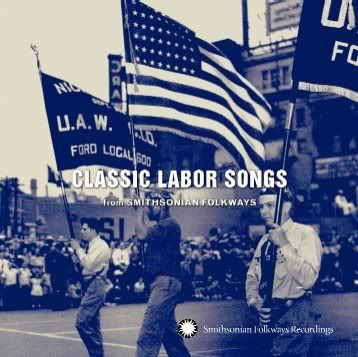 In the era of the sound bite, when songs are used to hawk everything from shampoo, soap, and cars to wine coolers, dating services, and Viagra, it is easy to lose sight of the more noble utilitarian use songs can have, and this haunting collection of 20th century labor songs calling for fairness, dignity, and a just wage is a compelling document of the power of songs to unite and enable.
In the era of the sound bite, when songs are used to hawk everything from shampoo, soap, and cars to wine coolers, dating services, and Viagra, it is easy to lose sight of the more noble utilitarian use songs can have, and this haunting collection of 20th century labor songs calling for fairness, dignity, and a just wage is a compelling document of the power of songs to unite and enable.Drawn from Smithsonian Folkways' vast collection and from Joe Glazer's Collector Records, which in 2006 became a part of the Smithsonian Folkways catalog, "Classic Labor Songs" from Smithsonian Folkways is by turns spirited, uplifting, wry, and ironic, and if some of these songs seem quaint in the light of today's complicated global economic landscape, the issues they raise for the fair and just treatment of labor continue to be extremely vital ones.
If one were to walk into a factory today and play Classic Labor Songs, the music probably wouldn’t rouse the employees to a frenzied state of uprising. But if performances like John Handcox’s “Roll the Union On” or Hazel Dickens’s “Black Lung” at first sound like quaint relics - poverty’s so cute when it’s in sepia - the album bristles with the passion of decades past, when standing up to the boss seemed like a realistic proposition.
Among the highlights here are Paul Robeson's stately "Joe Hill," which opens the sequence, John Handcox's unaccompanied field recording of his own "Roll the Union On" (based on the gospel song "Roll the Chariot On") from 1937, Woody Guthrie's heart-breaking "1913 Massacre" (based on a true incident during a miner's strike in Calumet, MI where 73 children lost their lives), and a shaky yet riveting version of Florence Reece singing her "Which Side Are You On" from a 1971 archival tape (she actually wrote the song during a miners' strike in Harlan County, KY in 1931) that dovetails seamlessly into the Almanac Singers' 1955 version of the same song.
But not everything here deals with miners and mill workers. Some of the songs have a distinct contemporary feel, like Tom Juravich's "VDT," which pleads the case of cubicle workers who spend all day entering data on a video display terminal, and John O'Connor's unaccompanied "Carpal Tunnel," which explores the health issues that stem from workplace tasks that require continual repetitive movement.
In an era when label-created hipsters rap on about getting personal respect all day over the airwaves, these songs seem unadorned and out of touch by comparison. But there is a quiet strength to them, and a deep understanding of what respect really means, and long after today's flavor of the week drops from sight (utility isn't always measured by chart position), these songs will still be sung.
Classic Labor Songs (Smithsonian Folkways)
(192 kbps, cover art included)
6 Kommentare:
Thank you
You are welcome!
Hi, who are the artists that sang these?
Here´s the tracklist:
01 Joe Hill - Paul Robeson03:05
02 Bread and Roses - Bobbie McGee02:34
03 Casey Jones (Union Scab) - Pete Seeger01:59
04 We Shall Not Be Moved-Roll the Union On - Joe Glazer02:27
05 Roll the Union On - John Handcox01:11
06 Cotton Mill Colic - Mike Seeger02:40
07 The Mill Was Made of Marble - Joe Glazer04:03
08 Aragon Mill - Peggy Seeger03:14
09 Talking Union - Almanac Singers03:06
10 1913 Massacre - Woody Guthrie03:40
11 The Preacher and the Slave - Utah Phillips02:23
12 Which Side Are You On--Which Side Are You On- - Florence Reece02:39
13 Hold the Fort - Joe Uehlein04:01
14 Union Maid - New Harmony Sisterhood Band03:09
15 Too Old to Work - Joe Glazer02:55
16 Black Lung - Hazel Dickens03:27
17 Been Rolling So Long - Larry Penn04:04
18 VDT - Tom Juravich02:01
19 Automation - Joe Glazer02:38
20 I'm Union and I'm Proud - Eddie Starr03:02
21 I'm a Union Card - Kenny Winfree02:31
22 Carpal Tunnel - John O'Connor02:42
23 We Just Come to Work Here, We Don't Come to Die - Anne Feeney02:54
thanks
You are welcome!
Kommentar veröffentlichen